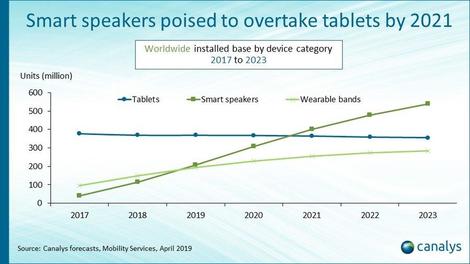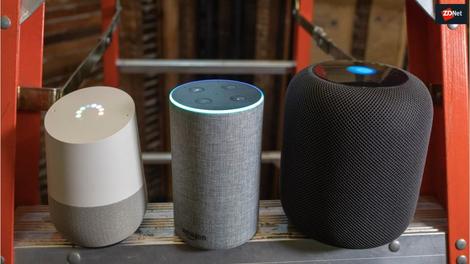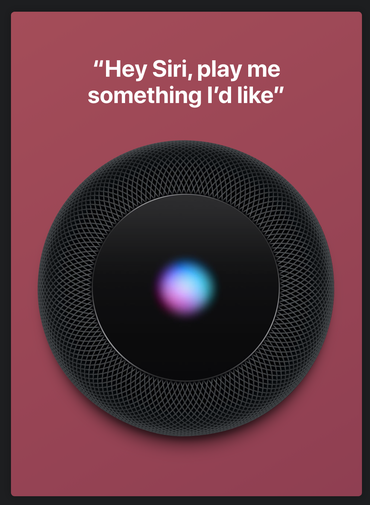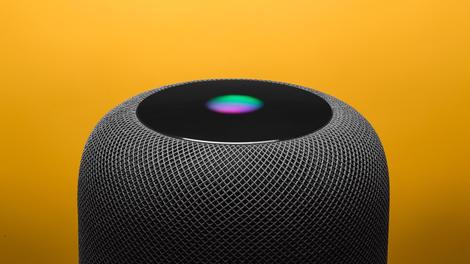Apple is set to announce the iPhone 12 during its Oct. 13 digital event. Given the event’s “Hi, Speed.” tagline and abundance of rumors, everyone expects a 5G iPhone. While Apple’s first 5G phone will certainly be the star of the show, I’m much more interested in one of the other possible announcements, an updated HomePod and a rumored $99 HomePod ‘Mini’. Why? Because our phones may be the gateway to us as individuals, but voice-enabled smart devices (like the HomePod) and the data-driven networks behind them are the gateway to our homes.
Smart devices and voice will be as revolutionary as the smartphone
Don’t get me wrong, I’m not saying the HomePod will make up more of Apple’s revenue than the iPhone any time soon. According to AAPL’s fiscal Q3 2020 Consolidated Financial Statements, the iPhone accounts for 4 times the revenue of the entire wearables, home and accessories category (of which the HomePod is no doubt a part):
$26.418 billion – iPhone$13.156 billion – Services$7.078 billion – Mac$6.582 billion – iPad$6.450 billion – Wearables, Home, and Accessories
Yet, the proliferation of smart devices and the internet of things (IoT) will transform our world as much, if not more than the smartphone.
First, the market for smart and IoT devices, already rivals the phone market in shear size. According to GSMA’s “The Mobile Economy 2020” report, the were 5.2 billion smartphone connections in 2019. According to the same report, there were 12.0 billion total IoT connections the same year…over twice as many. The smart speaker market is still a small part of the overall IoT market, but it is growing.


In 2019, Forrester reported that 41 million US homes have smart speakers. Canalys forecasted that the number of smart speakers worldwide would grow from 114 million in 2018 to 200 million by the end of 2019 and could overtake tablet use by 2021. A report from Strategy Analytics showed that annual shipments of smart speakers grew by 70% in 2019 to hit a record high of 147 million units. And while the global economic slow down from the COVID-19 pandemic has slowed the growth of the smart speaker market, ResearchAndMarkets.com still predicts that the market will reach $11 billion in 2023.
According to the 2020 NPR Smart Audio Report, about 60 million Americans 18+ own a smart speaker, up from about 53 million in 2019. NPR also found that the number of smart speakers in a given home is increasing. In 2019, they found that 21% of respondents reported owning three or more smart speakers. That number rose to 29% in 2020.
Second, the value of smart speakers to Apple, isn’t really in selling you another $100 or $200 device. The HomePod’s true value is its ability to let buyers interact with more Apple services through voice. And as voice increasingly becomes one of THE primary interface methods between humans and our devices, companies that master speech recognition technology will have a competitive advantage.
Even though we’re still in the early stages of voice adoptions, the trends are clear. Despite the privacy concerns associated with speech recognition technology, voice recognition use is on the rise. As Microsoft wrote in its 2019 Voice report, “People like using voice.”
According to Microsoft (which has it’s own digital assistant, Cortana), 72% of survey respondents reported using a digital assistant and “over half of the respondents have used voice skills and actions with the smart voice search through a smart home speaker.” In addition, Microsoft found the majority of respondents (57%) prefer to speak to their digital assistants instead of typing on a keyboard or touchscreen.
Unfortunately, sales of the Siri-powered HomePod lags behind smart speakers from Amazon and Google.
Apple is behind in the smart speaker space


According to eMarketer, Amazon holds a commanding lead in smart speaker sales shipping 15.8 million units in Q4 2019 alone. Google was second with 13.9 million followed by Chinese competitors Baidu (5.9 million), Alibaba (5.5 million) and Xiaomi (4.7 million). Apple was a distant 6th with only 2.6 million speakers. eMarketer found a similar breakdown when looking at smart speaker use, predicting that in 2020 69.7% of US smart speaker users will use an Echo. While 31.7% will use a Google-branded device and only 18.4% will use another brand, which included the Apple HomePod, Harmon Kardon Invoke and Sonos One.
Also: When is Prime Day 2020? Everything we know so far
HomePod Mini could be Apple’s key to the smart home and V-Commerce market
A rumored $99 HomePod Mini could help Apple overcome this smart speaker gap, encourage their customers to use other Apple products and services, and give Apple more leverage in the smart home space.
Microsoft found that while playing music was still the most reported use for smart speakers (63%), respondents were also using them to interact with smart home tech like lighting (57%), security system/cameras (38%), thermostats (37%), and automated door locks (22%).
“Like dominoes, disruption is occurring across anything home related from ovens, roombas, smoke detectors, locks, window shades, garage doors, flood sensors, cookware – you name it. Smart home technology is setting a new standard, especially in newly constructed homes,” Microsoft wrote.
V-Commerce, or “voice commerce,” like E-Commerce before it, is already transforming how consumers shop and that trend is poised to accelerate. Microsoft found that 34.9% of respondents “attempted to make a purchase using either a digital assistant or smart home speaker” and “enjoyed the experience.” 27.4% have not tried to make a purchase but would like in the future. And 54% “believe that digital assistants will help them make retail purchases within 5 years.”
And Apple competitors Amazon, Google, and Microsoft are investing heavily in voice, digital assistants, and smart speakers. In September this year, Amazon announced a new lineup of Echo smart speakers with a custom AZ1 neural edge process to help Alexa respond to commands more quickly. Earlier this month, Google unveiled the Nest Audio ($100) smart speaker to replace the Google Home, launched 2016. And while Microsoft doesn’t have a smart speaker yet, the company clearly has plans to make Cortana available on multiple devices. As Microsoft CEO Satya Nadella said in the report, “Your brand needs to have its own agents that can talk directly to customers and to converse across multiple digital assistants.”


I’m not saying Apple hasn’t made investments in Siri. At WWDC 2020, Apple did announce improvements to its digital assistant with the release of iOS 14, including a less intrusive placement on your iPhone or iPad screen, the ability to send audio messages through iMessage, larger knowledge base to help it better answer questions, and the ability to transcribe audio into text without a cloud connection using automatic speech recognition (ASR).
Even with this improvements however, it’s hard to get a sense of how Siri stacks up against other digital assistants in number of users because Apple has released those numbers. At CES in January 2020, Google said that over 500 million people use its Assistant every month and that there were at the time over 1 billion devices on which it could be used. In 2019, Microsoft found that Siri and Google were tied for the most used digital assistant at 36% of respondents, Amazon Alexa was third with 25% and Cortana was fourth with 19%.
Microsoft’s survey however didn’t indicate if people reported using multiple digital assistants or the frequency to which they choose one over the other. For example, I have an iPhone, Samsung Android phone, iPad, Samsung Android tablet, multiple Amazon Echos, an Amazon Fire TV Cube, and a HomePod. (What can I say, I’ve been a tech writer for 20 years and was an IT pro before that, so tech is my job and my hobby.)
I rarely if ever use Google Assistant on the Android devices because they’re mostly used for work. I sometimes use Siri on my iPhone when I’m away from home, which is almost never now because of COVID-19. I rarely uses Siri on my HomePod or iPad, because…it just doesn’t work very well for what I want it to do when I’m at home. But, I use Alexa on my Echos and Fire TV Cube multiple times a day, every day. I listen to news through one of the multiple digital radio services, music via Amazon Prime, check the weather, ask it for quick facts, check the status of Amazon deliveries, turn on and off the TV, mute the TV when I need to take a phone call, and do more unit conversions and set more cooking timers than Julia Child. I even prefer to play music using Apple Music on my iPhone through my Echo Plus via a bluetooth connection, because half the time I try to do the same thing on the HomePod it doesn’t work.
So while I’ve no doubt most of the tech presses attention during Apple’s Tuesday event will be on the 5g iPhone 12, I’ll be watching to see how they treat the HomePod as an indicator of whether Apple is serious about being a player in the smart home and voice-driven world of the the immediate future (at least until the brain-computer interface becomes the norm).
ZDNET’S MONDAY MORNING OPENER
The Monday Morning Opener is our opening salvo for the week in tech. Since we run a global site, this editorial publishes on Monday at 8:00am AEST in Sydney, Australia, which is 6:00pm Eastern Time on Sunday in the US. It is written by a member of ZDNet’s global editorial board, which is comprised of our lead editors across Asia, Australia, Europe, and North America.



